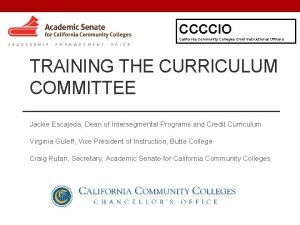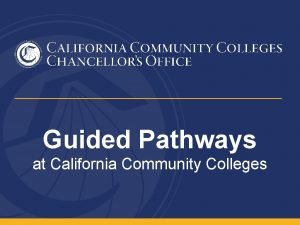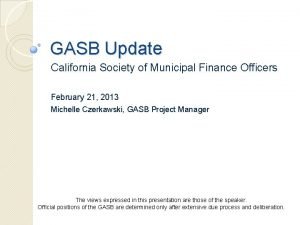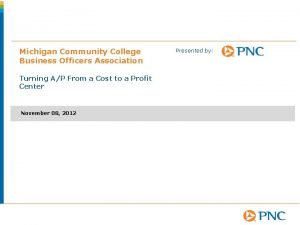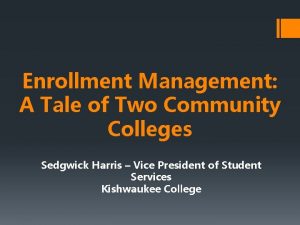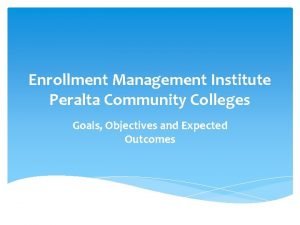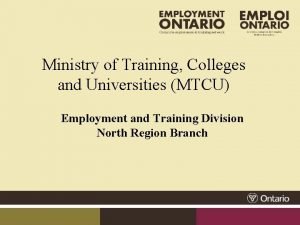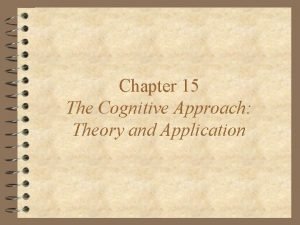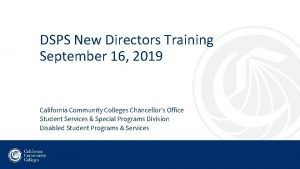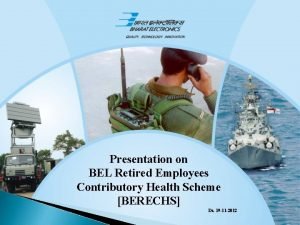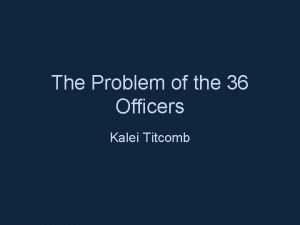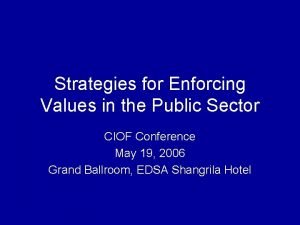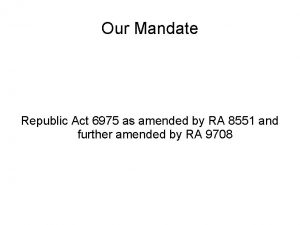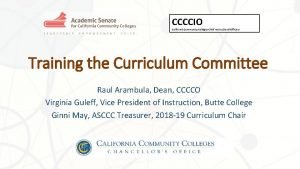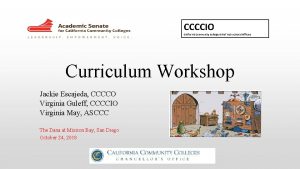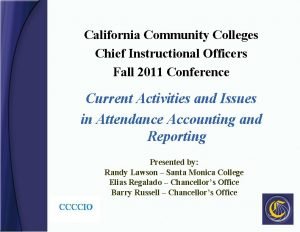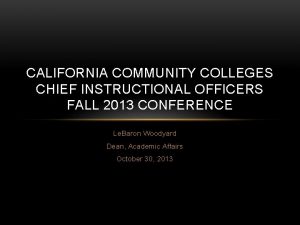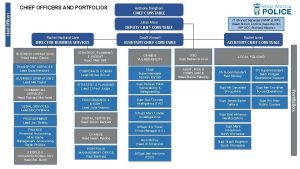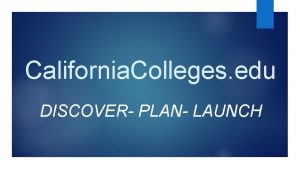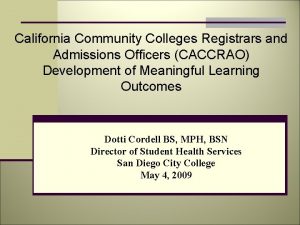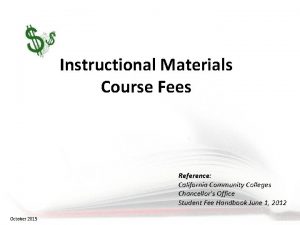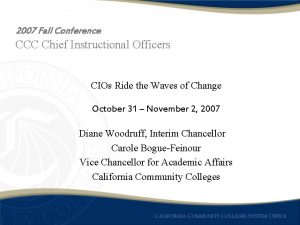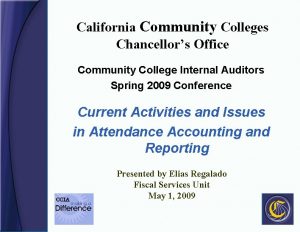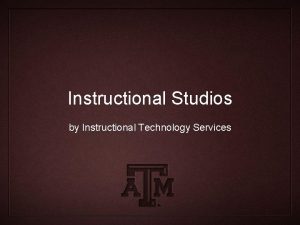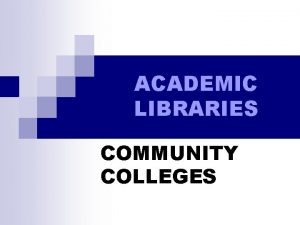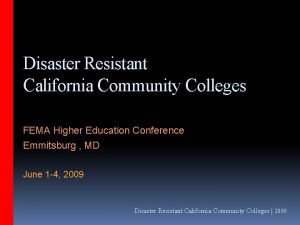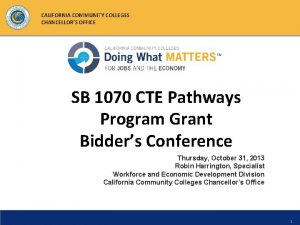CCCCIO California Community Colleges Chief Instructional Officers TRAINING



























- Slides: 27

CCCCIO California Community Colleges Chief Instructional Officers TRAINING THE CURRICULUM COMMITTEE Jackie Escajeda, Dean of Intersegmental Programs and Credit Curriculum Virginia Guleff, Vice President of Instruction, Butte College Craig Rutan, Secretary, Academic Senate for California Community Colleges


Senate President/Curriculum Chair/CEO/CIO Certification

2 nd Curriculum Certification • The second certification memo was distributed in Fall 2017 and was due to the Chancellor’s Office in October 2017. • The memo required the signature of • College President (CEO) • Chief Instructional Officer (CIO) • Academic Senate President • Curriculum Chair • Submitting the memo entitled the college to automated approval (chaptering) of credit courses, excluding cooperative work experience.

3 rd Curriculum Certification • Memo will be distributed in Fall 2018 and will be due to the Chancellor’s Office by October 16, 2018 • Memo will require the same signatures as in 2017 • Submitting the memo entitles the college to automated approval of: • All credit courses (including cooperative work experience) • Modifications to all existing credit programs except for ADTs • Note that changing program goal will require a new program submission • New credit degrees and certificates with a program goal of local (not ADTs or CTE)

Requirements of Certification • Colleges are certifying that all approved curriculum will align with all requirements outlines in Education Code, Title 5, and the 6 th edition of the Program and Course Approval Handbook • College must have a board policy related to the credit hour. Policy must be submitted to the CO with the certification memo. • College must have a cooperative work experience plan that has been approved by the local governing board (plan does not need to be submitted to the CO)

TRAINING THE CURRICULUM COMMITTEE

Types of Courses and Programs Credit Noncredit Courses • • • Degree-applicable Non degree-applicable Noncredit: no credit awarded for courses in 10 categories but approved by CO and receives apportionment Programs • • • Associate Degrees (AA, AS) Associate Degrees for Transfer (AA-T, AS-T) Certificates of Achievement 12 -18 units 18 or more units Locally Approved Certificates <18 units, CO approval optional but not required Certificate of Completion (CDCP) Certificate of Competency (CDCP) Adult High School Diploma Noncredit Apprenticeship Program Locally Approved Certificates (not CO approved)

Requirements for Credit Courses • • • Course Number and Title Catalog Description Prerequisites, Corequisites, Advisories Units Total Contact Hours Total Number of Hours in Each Instructional Category Outside of Class Hours Course Content Objectives/Outcomes Instructional Methods • • Grading criteria (letter grade, P/NP) Methods of Assessment Reading, Writing, and Outside of Class Assignments Repeatability Options Open Entry/Open Exit Justification of Need CCCCO Data Elements (e. g. TOP and SAM Codes, CB codes) Discipline Assignment(s)

Possible Items for COR Item Why you might want it Student Learning Outcomes ACCJC Standard II. A. 3 Required and Recommended Textbooks Aids in C-ID and 4 -yr articulation; helps new instructors Transfer/GE Information/C-ID It can be helpful to have this info on the COR Supplemental Instruction Could SI be part of your course? Distance Education Include modalities (e. g. online, hybrid) and possibly DE Addendum Enrollment limits Instructional quality, external accreditation requirements

Requirements Associate Degrees • Minimum of 60 units • At least 18 units in a major or area of emphasis • Can use local GE pattern • Chancellor’s Office Approval if goal is CTE. Local Approval is goal is Local • All revisions are locally approved

Associate Degrees for Transfer (ADTs) • Minimum of 60 units; no more than 60 units may be required • At least 18 units in a major • General education limited to a CSU Breadth or IGETC pattern • New and modified ADT’s require Chancellor’s Office approval 12

Certificates of Achievement • 18 or more related units must be Chancellor’s Office approved, noted on transcript (Changing to 16 units soon) • 12– 17. 5 units may be Chancellor’s Office approved, but it is not required (although it is recommended)* (Changing to 8 – 15. 5 • 3 units soon) • All new certificates with a goal of Transfer or CTE must be approved by the Chancellor’s Office. All revisions and new certificates with a goal of Local are locally approved. *Certificates noted on students’ transcript must be approved by the Chancellor’s Office. 13

CREDIT HOUR CALCULATION

Title 5 Requirements for Credit Hour California Code of Regulations, title 5 § 55002. 5 • (f) The governing board of each community college district shall establish policy, consistent with the provisions of this section, defining the standards for credit hour calculations. District policy shall specify the credit hour calculation method for all academic activities, expected ratios of in-class to outside-of class hours for each type of academic activity, standards for incremental award of credit, standard term length, calculation methods for short term and extended term courses, and provisions for monitoring compliance with state and federal regulations related to credit hour calculations

New: Local Governing Board Policy Now REQUIRED by new title 5 regulations - § 55002. 5(f) District policy shall specify: • the credit hour calculation method for all academic activities (lecture, activity, lab, clinical, discussion, studio, work experience, etc. ) • expected ratios of in-class to outside-of class hours for each type of academic activity • standards for incremental award of credit • standard term length (number used to determine divisor in calculation) • calculation methods for short term and extended term courses • provisions for monitoring compliance with state and federal regulations related to credit hour calculations Local policy is an academic and professional matter and should fall under your 10+1 process.

Standards for Credit Hour California Code of Regulations, title 5 § 55002. 5(a) “(a) One credit hour of community college work (one unit of credit) shall require a minimum of 48 semester hours of total student work or 33 quarter hours of total student work which may include inside and/or outside-of-class hours. ”

Sample Credit Hour Calculation To Calculate Units : *54 is used for this example based on the recommendation from the Chancellor’s Office that local districts use an 18 week semester as the basis for calculating hour to unit ratios on Course Outlines of Record. Likewise, . .

Cooperative Work experience • APPROVED PLAN REQUIRED - § 55250 • REQUIREMENTS OF THE PLAN - § 55251 • WORK EXPERIENCE CREDIT - § 55265. 5 • Approved at the July Board of Governor’s meeting and the revisions to regulations for CWE plans and courses will: • Support the streamlining of curriculum by transferring authority from the Chancellor’s Office to local districts to approve CWE plans and courses. • Allow colleges to incremental units.

CWE - REQUIREMENTS OF THE PLAN - § 55250 Any program of Cooperative Work Experience Education conducted by the governing board of a community college district pursuant to this article and claimed for apportionment pursuant to sections 58051 and 58009. 5 shall conform to a plan adopted by the district. The plan adopted by the district shall set forth a systematic design of Cooperative Work Experience Education whereby students, while enrolled in college, will gain realistic learning experiences through work. This plan shall be submitted to and approved by the Chancellorlocal governing board.

CWE - § 55251. REQUIREMENTS OF THE PLAN (a) The district plan shall contain the following provisions: (1) A statement that the district has officially adopted the plan, subject to approval by the State Chancellorlocal governing board. (2) A specific description of the respective responsibilities of college, student, employer, and other cooperating agencies in the operation of the program. (3) A specific description for each type of Cooperative Work Experience Education program. (4) A description of how the district will: (A) Provide guidance services for students during enrollment in Cooperative Work Experience Education. (B) Assign a sufficient number of qualified, academic personnel as stipulated in the district plan to direct the program and to assure district services required in section 55255. (C) Assure that students' on-the-job learning experiences are documented with written measurable learning objectives. (D) With the assistance of employers, evaluate students’ on-the-job learning experiences. (E) Describe basis for awarding grade and credit. (F) Provide adequate clerical and instructional services. (b) Prior to implementation, any changes or revisions to the district plan shall be submitted for approval to the Chancellorlocal governing board.

CWE - § 55256. 5. Work Experience Credit (a) One student contact hour is counted for each unit of work experience credit in which a student is enrolled during any census period. In no case shall duplicate student contact hours be counted for any classroom instruction and Cooperative Work Experience Education. The maximum contact hours counted for a student shall not exceed the maximum number of Cooperative Work Experience Education units for which the student may be granted credit as described in section 55253. (b) The learning experience and the identified on-the-job learning objectives shall be sufficient to support the units to be awarded. (c) The following formula will be used to determine the number of units to be awarded: (1) Each 75 hours of paid work equals one semester credit or 50 hours equals one quarter credit. (2) Each 60 hours of non-paid work equals one semester credit or 40 hours equals one quarter credit. (3) Units may be awarded in 0. 5 unit increments.

SUMMARY OF RESPONSIBILITIES


Things to Keep in Mind • Colleges must submit all courses to the Chancellor’s Office using the Chancellor’s Office Curriculum Inventory (COCI) • Colleges are still required to have a course control number before they can offer a course. • The Chancellor’s Office is still reviewing and approving all noncredit, new and revised ADTs, and new CTE programs. • The Chancellor's Office will conduct periodic reviews on all the courses that are receiving automated approvals.

Periodic Review by Chancellor’s Office • Colleges will have their curriculum reviewed at least once every three years (and could be as frequently as once a year). • Colleges that have been found to have curriculum that does not meet all requirements will be contacted by the CO. • Colleges may be encouraged to have an assistance visit by representatives from the CO, CIOs, and ASCCC • Colleges that refuse to follow the requirements for automated approval will have the approval disabled and all curriculum will need to be reviewed and approved by the Chancellor’s Office

QUESTIONS?
 California community college chief instructional officers
California community college chief instructional officers California community college chief instructional officers
California community college chief instructional officers Cccco guided pathways
Cccco guided pathways Community education and training colleges
Community education and training colleges Chief medical officers physical activity guidelines
Chief medical officers physical activity guidelines California society of municipal finance officers
California society of municipal finance officers Chapter 9 lesson 3 commander in chief and chief diplomat
Chapter 9 lesson 3 commander in chief and chief diplomat Community college business officers
Community college business officers Community colleges
Community colleges Washington state board for community and technical colleges
Washington state board for community and technical colleges Community colleges
Community colleges Association of canadian community colleges
Association of canadian community colleges Training officers consortium
Training officers consortium Kelly fowler merced college
Kelly fowler merced college Ministry of training colleges and universities sudbury
Ministry of training colleges and universities sudbury Self-instructional training example
Self-instructional training example Self-instructional training example
Self-instructional training example Chief data officer training
Chief data officer training Ccap california community college
Ccap california community college California lti training
California lti training Bel retired officers association bangalore
Bel retired officers association bangalore Ft belvoir officers club
Ft belvoir officers club International foundation for protection officers
International foundation for protection officers 36 officers problem
36 officers problem Police officer's pledge
Police officer's pledge The tell tale heart stylistic devices
The tell tale heart stylistic devices R.a. no. 6975
R.a. no. 6975 Othello's enemy
Othello's enemy
